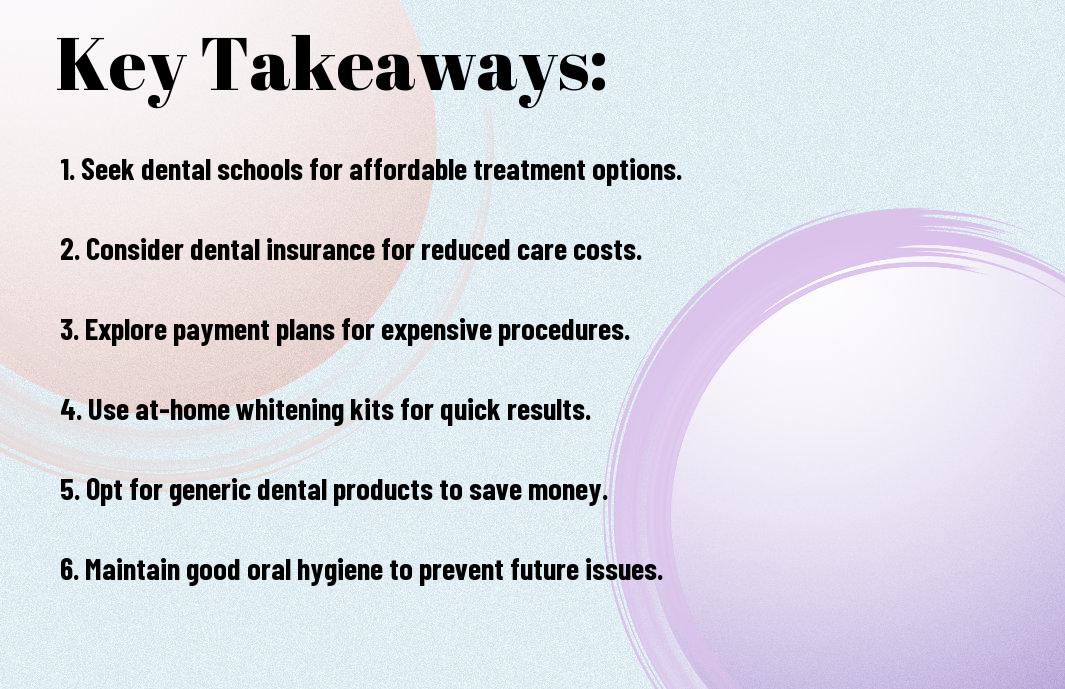Over time, dental issues can arise, leading you to seek quick and affordable solutions. Whether you are dealing with misalignment, decay, or cosmetic concerns, understanding the most efficient ways to fix your teeth can save you time and money. In this post, we will explore various options, from clear aligners and dental bonding to over-the-counter whitening kits, helping you make informed decisions for your oral health without breaking the bank.
Key Takeaways:
- Whitening strips are a cost-effective option for brightening teeth quickly at home.
- Dental bonding can repair minor chips and gaps affordably and quickly.
- Clear aligners offer a discreet and often faster alternative to traditional braces for teeth straightening.
- Regular dental hygiene practices like brushing and flossing can prevent costly future dental work.
- Consultation with a dentist can provide tailored solutions that balance cost and speed for your specific needs.

Common Dental Issues
For many individuals, dental issues arise due to various factors such as poor oral hygiene, diet, and genetics. Understanding these common dental problems can help you address them promptly and effectively. Addressing issues early can prevent further complications and ensure your smile stays bright and healthy.
Types of Tooth Problems
For your dental health, recognizing the common types of tooth problems is vital. These include:
- Cavities
- Gum disease
- Tooth sensitivity
- Chipped or cracked teeth
- Misalignment
Thou should take these issues seriously.
| Type of Issue | Description |
| Cavities | Decay that leads to holes in teeth. |
| Gum Disease | Infection that damages gum tissue. |
| Tooth Sensitivity | Sharp pain when consuming hot or cold items. |
| Chipped Teeth | Fractures or breaks in the tooth structure. |
| Misalignment | Improper positioning of the teeth. |
Impact of Dental Issues on Health
For you, dental issues can affect more than just your smile; they can have serious implications for your overall health. Untreated dental problems can lead to infections, pain, and even systemic diseases that impact your well-being.
It is vital to understand that dental issues can link to other health concerns, such as heart disease and diabetes. Poor oral health can contribute to inflammation that affects your body’s ability to function optimally. Addressing dental issues promptly can enhance your quality of life and prevent serious health complications down the road.
Affordable Options for Dental Care
It’s necessary to explore affordable options for dental care that prioritize both your health and your budget. Many clinics offer payment plans, and community health programs often provide low-cost services. Additionally, dental schools may offer treatments performed by students under the supervision of experienced faculty, which can significantly reduce expenses while still ensuring quality care. Your oral health doesn’t have to be a financial burden when you seek out these valuable resources.
Preventive Measures
By maintaining a consistent oral hygiene routine, you can save money on dental treatments in the long run. Brushing twice daily, flossing regularly, and visiting your dentist for regular check-ups can help prevent issues such as cavities and gum disease. These simple, everyday practices ensure your teeth stay healthy and reduce the need for costly interventions.
Budget-Friendly Treatments
Affordable dental treatments are available for those who need restoring or cosmetic work without the steep price tag. Options such as dental bonding, fluoride treatments, and basic fillings can be significantly less expensive compared to crowns or veneers. Many dentists offer discounts or flexible payment plans to accommodate your financial situation, so it’s wise to ask about these options during your consultation.
Considering your treatment options can help you make informed decisions without breaking the bank. Many budget-friendly treatments, like silver amalgam fillings or composite resin bonding, can effectively resolve dental issues at a fraction of the cost of more invasive procedures. Consulting with your dentist about these alternatives can provide the care you need while keeping your finances in check. Taking the time to research and discuss these treatments can lead to great outcomes for your oral health.
Fast Solutions for Dental Repairs
After experiencing dental issues, you may be eager to find fast solutions for repairs. Options such as dental bonding or porcelain veneers can quickly fix minor damages. If you’re searching for the most affordable options, check out What is the cheapest way to replace a missing tooth for guidance on cost-effective alternatives.
Temporary Fixes
For immediate relief, you can try temporary fixes such as dental wax or over-the-counter dental repair kits. These solutions can help protect damaged teeth until you visit a dentist for a more permanent repair.
Quick Dental Procedures
Procedures like dental fillings or crowns can address issues like cavities or weakened teeth quickly. These treatments often take just a single visit and can restore your tooth’s functionality and appearance efficiently.
A dental filling involves removing decay and filling the space with a durable material, while crowns cover the entire tooth to protect it from further damage. Both options can be completed within an hour, allowing you to leave the office with a smile and without any lingering concerns.
Comparing Costs: DIY vs. Professional Care
Despite the appeal of DIY methods for fixing your teeth, professional care often provides a more reliable and safe option. To help you understand the financial differences, here is a breakdown of costs associated with each approach:
| Method | Average Cost |
|---|---|
| DIY Treatments | $10 – $100 |
| Professional Cleanings | $75 – $200 |
| Whitening Kits | $20 – $500 |
| Fillings | $150 – $400 |
| Braces/Invisalign | $3,000 – $8,000 |
Pros and Cons of DIY Methods
Besides the cost savings you may find, DIY methods come with their own set of benefits and downsides. Consider the following factors:
| Pros | Cons |
|---|---|
| Lower costs | Risk of ineffectiveness |
| Convenience | Potential for damage |
| Accessibility | Lack of professional guidance |
| No appointment needed | Variable results |
| Flexibility in treatment | Possible health risks |
Cost Analysis of Professional Treatments
At first glance, professional dental treatments seem more expensive compared to DIY options. However, the investment often pays off in terms of quality and effectiveness. Professional care provides you access to experienced professionals who can address complex issues safely and efficiently. Such treatments not only ensure your dental health but can also save you money in the long run by preventing further complications.
Consequently, investing in professional dental care is justified as it offers a higher level of expertise and treatment innovation. Factors such as long-term health benefits, guaranteed results, and reduced risk of harm contribute to the value of paying for professional services. While DIY strategies may be tempting due to lower immediate costs, your dental health deserves expert attention for optimal outcomes.
Understanding Dental Insurance
Your dental insurance plays a significant role in managing your dental expenses. It helps cover a portion of the costs related to preventive care, fillings, and other necessary treatments. By understanding your dental plan, you can navigate available services and avoid unexpected bills. Knowing what is covered and what isn’t can lead to more effective budgeting for your dental care.
Coverage Options
One major aspect of dental insurance is the range of coverage options available. These can vary widely depending on the plan, with some focusing on preventive care while others may offer additional benefits for orthodontics or major procedures. Familiarizing yourself with the specifics of your policy can help you make informed decisions about your dental health.
Maximizing Your Benefits
Maximizing your benefits involves utilizing your dental plan effectively to get the most value out of your coverage. Schedule regular check-ups and preventive treatments, as these are often fully covered, preventing potential issues from escalating into more costly procedures.
A proactive approach also means staying informed about your plan’s limits and exclusions. This can help you strategize your dental care throughout the year, ensuring you book necessary treatments before your benefits reset. Moreover, some providers offer discounts for services if you’re a member of certain insurance plans, so be sure to ask about any additional savings available to you.

Tips for Maintaining Dental Health
All good dental practices can help you maintain your smile and prevent costly procedures. Follow these necessary tips:
- Brush your teeth twice a day.
- Floss daily to remove plaque between teeth.
- Limit sugary snacks and drinks.
- Stay hydrated, especially with water.
- Use a fluoride toothpaste.
- Avoid tobacco products.
Assume that incorporating these practices into your daily routine will significantly enhance your dental health.
Daily Care Practices
Around your busy day, make time for simple habits that can greatly impact your dental health. Maintaining a consistent routine of twice-daily brushing and daily flossing will remove plaque build-up. It’s also beneficial to use an antibacterial mouthwash, as it can help reduce bacteria and freshen your breath.
Regular Check-Ups
The importance of regular dental check-ups cannot be overstated. Visiting your dentist every six months allows for early detection of potential issues and professional cleaning, which can keep your teeth and gums healthy.
Indeed, these check-ups provide opportunities for your dentist to assess your oral health, address any concerns, and offer guidance on best practices. This proactive approach can help you avoid more significant problems down the road, ultimately saving you money and time while ensuring your smile stays bright and healthy.
To wrap up
So, if you’re looking for the cheapest and fastest way to fix your teeth, consider options like dental bonding or teeth whitening solutions at home. Regular dental check-ups can also ensure that minor issues are caught early, saving you money over time. Additionally, explore dental schools in your area, as they often offer discounted services performed by students under professional supervision. Prioritize good oral hygiene to extend the longevity of your dental work and minimize future costs.
FAQ
Q: What are the most affordable options for fixing teeth?
A: The most affordable options for fixing teeth typically include dental bonding, tooth-colored fillings, and simple extractions if a tooth is too damaged to save. Dental bonding, which uses a composite resin to repair chips and gaps, can be done in a single visit and is usually less costly than crowns or veneers. Tooth-colored fillings are a cost-effective way to treat cavities without the need for more expensive restorations. However, for more complex issues, exploring payment plans or dental schools that offer reduced-cost treatments may also be beneficial.
Q: How long does it take to see results from these treatments?
A: The time it takes to see results from dental treatments can vary greatly depending on the type of service provided. For instance, dental bonding can usually be completed in one appointment lasting about 30 minutes to an hour, yielding immediate results. Fillings are equally quick, often requiring less than an hour. However, if braces or aligners are necessary for correcting alignment issues, the process can take several months to years, depending on the severity of the misalignment. Thus, for quick and affordable fixes, bonding or fillings are the best choices.
Q: Are there any fast ways to improve the appearance of teeth without extensive procedures?
A: Yes, there are several quick methods to enhance the appearance of teeth without undergoing extensive procedures. Over-the-counter whitening strips can brighten teeth within a few days, while specific whitening toothpastes may gradually improve their color. Another fast solution includes using dental veneers, which can be placed over existing teeth to mask imperfections. Additionally, if you’re looking to address gaps or misalignments immediately, orthodontic options like snap-on veneers can provide a temporary yet noticeable change while you explore long-term solutions.






